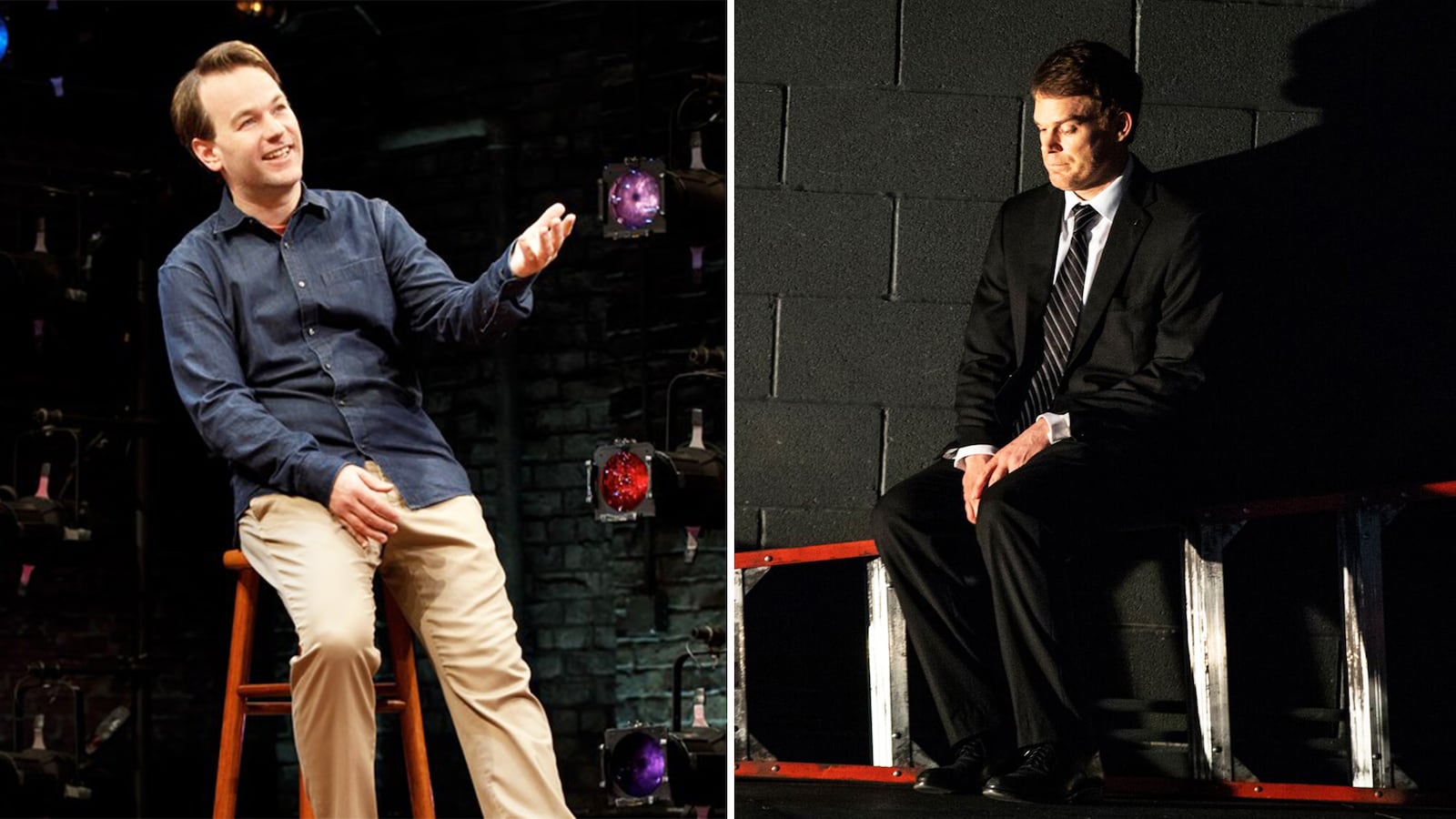Mike Birbiglia’s ‘The New One on Broadway’
Here is a prediction: No matter how bad your mood, no matter how many zombiefied Midtown Manhattan pedestrians have obstructed your walk to the Cort Theatre on 48th Street, no matter how terrible that day’s news has made you feel, no matter how terrible everything seems, Mike Birbiglia will make you laugh. A lot. Such a lot.
His 90-minute stand-up show, The New One, directed on a grand stage but also intimately by Seth Barrish, is centered around having children. But really it is also a thoroughly entertaining journey through the highways and byways of Birbiglia’s mind, and a lovely, generous slice of supremely executed observational comedy.
Something I have discovered in the last few days: Birbiglia is not known at all by some, and hardcore-adored by his fans. He has filled huge venues before, and has had Netflix specials. His book Sleepwalk With Me and other Painfully Truer Stories was a New York Times bestseller and a finalist for the Thurber Prize for American Humor. He is a contributor to This American Life, whose creator and host, Ira Glass, is the executive producer of this Broadway show.
Birbiglia is not an extravagantly dressed or made-up stage performer; he appears in shirt and chinos, a regular dad-bodded guy, who also doesn’t affect to be too regular. His unassuming demeanor is not part of the joke, but it does accentuate his humor, which is the opposite of unassuming or lazy. His first extended riff is about the beauty of couches, which, to him are humble. “They’re like, ‘This is about you. You wanna take a nap? Be my guest. You wanna have sex with my arm? I’ll think about it.’”
This makes them quite different from beds, with names like king, and which have entire rooms named after their arrogant selves.
While you’re laughing at Birbiglia, he’s also studding these sparkling comedic riffs with pathos. “We’ve spent thousands of hours together on this couch,” he says. “We’ve watched classic films on this couch. We’ve eaten 20 birthday cakes on this couch. We’ve laughed hysterically on the couch.
“We’ve cried in each other’s arms when we discovered that we had to put our cat Ivan to sleep on the couch. It’s soft, yet firm. Filthy, yet spotless. Colorful, yet no one can agree on what color it is. I think it’s green. My wife thinks it’s gray. I looked it up—chocolate. Which is fitting because there’s chocolate in it.”

Birbiglia really isn’t into the idea of having children at first; his own nephew, beloved as he is, has made his brother “uncool.”
“That baby doesn’t need to be anywhere,” he thinks of one baby on a flight. “I’m wearing noise-canceling headphones. Which apparently aren’t enough. You need... baby... canceling...headphones. Which... are condoms.”
Relaying this humor on the page possibly does not do the eternally awkward and out of sync with the world Birbiglia justice—how he misnames his wife, and the litany of illnesses that he thinks mitigate against himself being any kind of parent, including bladder cancer and a really terrible sleep disorder he made a film about.
“If you haven’t seen Sleepwalk With Me it’s based on this true life incident about 15 years ago where I jumped through a second-story window at a La Quinta Inn in my sleep,” he tells us. “When I say ‘through’ I mean ‘through the glass,’ and the glass was about a centimeter from femoral artery, and had it struck there I would have bled out on the front lawn and died. I was diagnosed with what’s called REM Behavior Disorder.”
And of course, you shouldn’t be laughing, but there is something about the way Birbiglia prowls around Beowulf Boritt’s spare stage (concealing one of this autumn’s best Broadway visual surprises), even when he’s divulging something terrible or serious, that keeps you smiling so much you find yourself thinking: “Stop smiling, he is telling you about bladder cancer and a life-threatening sleep condition.”
There is also a bruiser of a cat, Mazzy, who tortures Birbiglia, and eventually a bedsheet that becomes a necessary straitjacket. There are worries about sperm, and eventually penis surgery. “I swim, but in circles in the shallow end and I’m always ordering hot dogs at the side of the pool, which is not a quality you want in your sperm, that hungry lethargic quality. You want your sperm to be like ‘I swim from sea to sea!’ like the Ryan Lochte of sperm without all the fake robbery.”
There will be no spoilers here about how all this works out, but the tone and pitch of the comedy changes dramatically toward the end of the 90 minutes. It has to; one of Birbiglia’s final revelations is that his new life means he now laughs in a new way himself. You think you could stay there even longer. Birbiglia is the kind of ribald, engaging storyteller you never want to stop.
Mike Birbiglia’s The New One is at the Cort Theatre, New York City, through Jan. 20.
‘Thom Pain (based on nothing)’
A very different monologue opened at the Signature Theatre off-Broadway on Sunday evening. To the mysterious fictional character of Thom Pain, Michael C. Hall brings elements of the off-kilter character perversity he endowed his characters in Dexter and Six Feet Under with and which he discussed in a recent interview with me in which he also discussed his “fluid” sexuality.
Will Eno’s character in Thom Pain (based on nothing)—a strange man who we know very little about, and who wants it to stay that way as he toys with us for 70 minutes—can stand as much perversity as any actor wants to bring to him. There is no middle ground with this show: You will have either have no patience for this kind of willful strangeness, or a lot. (Obviously, Michael C. Hall fans will have a lot.)
In his notes for the show, Eno writes of the character of Pain: “He must also be charismatic, must be able to ‘run the show,’ but run it without a lot of apparent effort, relying more on a kind of dark energy, a seductive quality that comes from him being unpredictable and maybe a little unknowable. All that said, the actor must also create a character that is close to—and largely derived from—himself.”
There are dust sheets hanging from the ceiling and walls, and on stage at the Signature Theatre, seemingly hollowed out right to its own skeleton, designer Amy Rubin has created a kind of building site: a hole gouged out in one bit of floor; old air conditioners; two huge ladders propped into each other at the back of the stage; and containers of what look like mixing materials.

The setting is a mystery in itself. Where the hell are we supposed to be? A theater itself, as Hall told me recently he imagined. Whatever, the space feels too big for the project. For all his presence, periodically we lose Hall to the cavernous stage when this performance works best close up. Given this is a character in retreat from us anyway, even more spatial distance, while thematically on point, is not helpful.
When Hall as Pain first appears, we significantly don’t see him. He is shrouded in darkness and only occasionally lit by the flare of a match. This is significant for a character who is determined to be both present, to insist on a presence, and also to remain elusive and unknowable.
There is humor in Thom Pain. He would like to make us laugh, then as we laugh he turns on us in this disquisition on “fear, boyhood, nature, hate, the nature of performance and vice-versa, the heart of man, of woman, et cetera.”
Eno and Hall’s monologue, directed by Oliver Butler, is a willfully perverse puzzle, and its true purpose and meaning probably best known by Eno. Dressed in a dark suit (undertaker-ish and rakish all at once), Hall delivers the story of a man’s life in fragments, but as soon as he reveals something like his tortured childhood, he un-reveals it, or complicates it, or baits the audience about knowing anything, and then goes off on a tangent about something completely different.
We are asked to imagine a boy, a little timid, partly stupid, ashamed, afraid, “like us, like you,” and still have him suspended in that image over an hour later. A minute later he tells us one of us has won a raffle, but wait. Have we?
He has to go, he has to stay, he wants to tell us something, we don’t deserve to know anything. Thom Pain is not waiting for a Godot but is just as frantic as Beckett’s Didi and Gogo about whatever that existential date with destiny might mean.
Pain’s mercurial sense of reality and unreality gives a certain liberty to the text, and to all those listening to it. It’s a kind of choose your own Thom Pain, or tease a Thom Pain from whatever skein of narrative thread you manage to grasp on to (when he got stung by a bee or had a dog, and later a bad relationship).
For all its maze-like construction, there also seems to be something simple and tragic here. Thom Pain has had his heart broken, and whatever else we are watching, we are watching someone hurt, confused, and utterly lost.
“Please say you saw somebody trying,” Pain asks us to tell anyone who asks us later what we were doing tonight. If anyone asks. He stands still for just under a minute observing us.
Hall-as-Pain also comes out into the audience twice, and it says something about how masterfully he plays someone so disturbed and disturbing that a theater full of suddenly frozen bodies greets the possibility of being chosen by this character to join him on stage.
What does he want with us? What does he want from us? Some people eagerly responded to the questions Pain first asks of the audience, and then crickets as the character’s tone became darker. But these are big questions: What is love, what is pain, what is carrying on, how do I do it, where should I go, what should I do?
It is a creepy, unsettling hour, a queasy voyage into a fractured mind, which Hall injects with menace and coldness. This aggressive, gaslighting retreat right in front of an audience’s eyes is a fascinating literary exercise, but not a wholly successful theatrical one.
“You’ll see me soon enough, I suspect. But not yet,” Pain had told us at the beginning of the monologue, when shrouded in darkness. Later, he will invoke a disappearing act. Even with the lights on, this character has concealed himself. He is invisible even when he’s in front of us. Thom Pain is right there and never there, and in Hall’s hands we are scared of him and scared for him.
Thom Pain (based on nothing) is at Signature Theatre, New York City, until Dec. 9.








